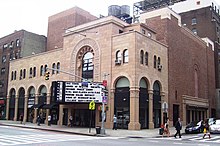
Tevye the Dairyman, also translated as Tevye the Milkman is the fictional narrator and protagonist of a series of short stories by Sholem Aleichem, and their various adaptations, the most famous being the musical Fiddler on the Roof, which premiered on Broadway in 1964, and its 1971 film adaptation. Tevye is a pious Jewish dairyman living in the Russian Empire, the patriarch of a family including several troublesome daughters. The village of Boyberik, where the stories are set, is based on the town of Boyarka, Ukraine, then part of the Russian Empire. Boyberik is a suburb of Yehupetz, where most of Tevye's customers live.

Solomon Naumovich Rabinovich, better known under his pen name Sholem Aleichem, was a Yiddish author and playwright who lived in the Russian Empire and in the United States. The 1964 musical Fiddler on the Roof, based on Aleichem's stories about Tevye the Dairyman, was the first commercially successful English-language stage production about Jewish life in Eastern Europe.

Yiddish theatre consists of plays written and performed primarily by Jews in Yiddish, the language of the Ashkenazi Jewish community. The range of Yiddish theatre is broad: operetta, musical comedy, and satiric or nostalgic revues; melodrama; naturalist drama; expressionist and modernist plays. At its height, its geographical scope was comparably broad: from the late 19th century until just before World War II, professional Yiddish theatre could be found throughout the heavily Jewish areas of Eastern and East Central Europe, but also in Berlin, London, Paris, Buenos Aires and New York City.
The Vilna Troupe, also known as Fareyn Fun Yiddishe Dramatishe Artistn and later Dramă şi Comedie, was an international and mostly Yiddish-speaking theatre, one of the most famous in the history of Yiddish theater. It was formed in and named after the city of Vilnius (Vilna) in the Russian Empire, later capital city of Lithuania. Distinctly Modernist, and strongly influenced by Russian literature and by the ideas of Konstantin Stanislavski, their travels in Western Europe and later to Romania played a significant role in the dissemination of a disciplined approach to acting that continues to be influential in the present day.

Peretz Hirshbein ; 7 November 1880, Kleszczele, Grodno Governorate – 16 August 1948, Los Angeles) was a Yiddish-language playwright, novelist, journalist, travel writer, and theater director. Because his work focused more on mood than plot, he became known as "the Yiddish Maeterlinck". His work as a playwright and through his own short-lived but influential troupe, laid much of the groundwork for the second golden age of Yiddish theater that began shortly after the end of World War I. The dialogue of his plays is consistently vivid, terse, and naturalistic. Unusually for a Yiddish playwright, most of his works have pastoral settings: he had grown up the son of a miller, and made several attempts at farming.
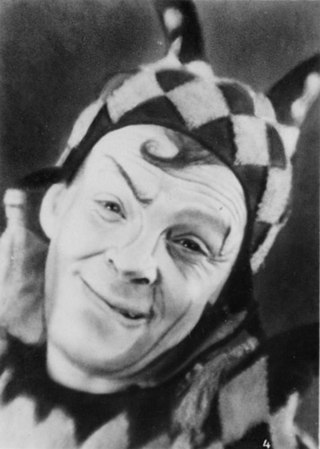
Benjamin Zuskin was a Soviet and Russian actor and director of the Moscow State Jewish Theatre (GOSET). Zuskin had the title of People's Artist of the RSFSR.
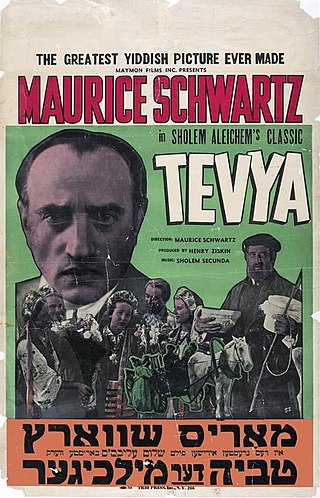
Tevya is a 1939 American Yiddish film, based on author Sholem Aleichem's stock character Tevye the Dairyman, also the subject of the 1964 musical Fiddler on the Roof. It was the first non-English language picture selected for preservation by the National Film Registry.

Maurice Schwartz, born Avram Moishe Schwartz, born in the Volhynia province of the Russian Empire, was a stage and film actor active in the United States. He founded the Yiddish Art Theatre and its associated school in 1918 in New York City and was its theatrical producer and director. He also worked in Hollywood, mostly as an actor in silent films but also as a film director, producer, and screenwriter.
Miriam Kressyn, one of the "First Ladies of the Yiddish Theater", acted and sang on stage, film and radio; she wrote plays as well.
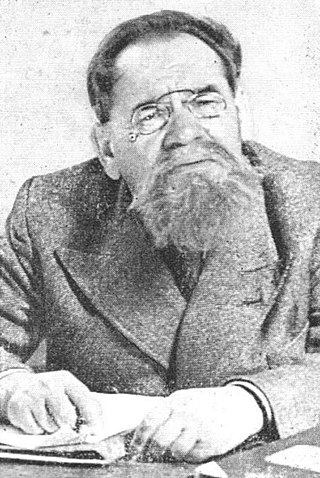
Yehoshua Bertonov was an Israeli stage actor.

Alexander Olshanetsky was an American composer, conductor, and violinist. He was a major figure within the Yiddish theatre scene in New York City from the mid-1920s until his death in 1946.

Joseph Rumshinsky (1881–1956) was a Jewish composer born near Vilna, Lithuania. Along with Sholom Secunda, Alexander Olshanetsky and Abraham Ellstein, he is considered one of the "big four" composers and conductors of American Yiddish theater.

The Irving Place Theatre was located at the southwest corner of Irving Place and East 15th Street in the Union Square neighborhood of Manhattan, New York City. Built in 1888, it served as a German language theatre, a Yiddish theatre, a burlesque house, a union meeting hall, a legitimate theatre and a movie theatre. It was demolished in 1984.
The Garden Theatre was a major theater on Madison Avenue and 27th Street in Manhattan, New York City. The theatre opened on September 27, 1890, and closed in 1925. Part of the second Madison Square Garden complex, the theatre presented Broadway plays for two decades and then, as high-end theatres moved uptown to the Times Square area, became a facility for German and Yiddish theatre, motion pictures, lectures, and meetings of trade and political groups.

Zalmen Zylbercweig was a historian of Yiddish theater. He is best known as the author of the six-volume Leksikon fun yidishn teater, the largest reference work on the history of Yiddish theatre.
Ran Avni is the founder of the Jewish Repertory Theatre (JRT) and was its artistic director from 1974 till 2004. JRT specialized in Jewish related plays in English and grew over its 30-year history to become a major theatrical institution in New York City. His vision for the company was to produce material "about Jewishness, about roots, about their value, their loss, the search for roots, the distaste of roots, the joy of roots". JRT produced original works by renowned playwrights such as Arthur Miller, Arthur Laurents, and Galt MacDermot, and presented rare revivals by the likes of Jerry Herman, David Mamet, Ira Levin and many more. As important as the theater's role in developing and presenting plays by new playwrights and was its role in launching the careers of actors, directors and designers. The theater was privileged to work with stars like Dianne Wiest and F. Murray Abraham as well as numerous prominent New York theater actors. Mr. Avni also directed many of the theater's productions, plays among them 'Up From Paradise', 'The Grand Tour', and 'Kuni Leml', for which he received the Outer Critics' Circle Award and was cited in the 1984-85 "Best Plays" publication as best director of a musical Off or On Broadway. He directed the Broadway production of 'Yiddle with a Fiddle', an English adaptation of the Yiddish classic. Many of the more than 120 productions the theater presented over the years have moved into commercial venues in New York and nationally.

Village East by Angelika is a movie theater at 189 Second Avenue, on the corner with 12th Street, in the East Village of Manhattan in New York City. Part of the former Yiddish Theatre District, the theater was designed in the Moorish Revival style by Harrison Wiseman and built from 1925 to 1926 by Louis Jaffe. In addition to Yiddish theatre, the theater has hosted off-Broadway shows, burlesque, and movies. Since 1991, it has been operated by Angelika Film Center as a seven-screen multiplex. Both the exterior and interior of the theater are New York City designated landmarks, and the theater is on the National Register of Historic Places.

Yiddish cinema refers to the Yiddish language film industry which produced some 130 full-length motion pictures and 30 shorts during its heyday from 1911 and 1940. Yiddish film almost disappeared after World War II, due to the Holocaust and the linguistic acculturation of Jewish immigrants, though new pictures are still made sporadically.
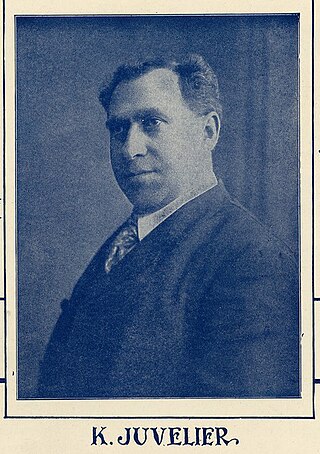
Kalman Juvelier was an Austrian-born Yiddish theatre actor and manager, Broder singer, Tenor, and recording artist of the late nineteenth and early twentieth centuries, who was active both in Europe and the United States. After emigrating to the United States in 1900, he became a key figure in the Yiddish theatre in New York, working with such notables as Boris Thomashefsky, David Kessler, Bertha Kalich and Jacob P. Adler and was director of the Hebrew Actor's Union as well as the Jewish Theatrical Alliance. From roughly 1905 to 1918, he recorded roughly 90 Yiddish language discs, mostly Yiddish theatre music, for most of the major record labels in the New York area.

Berta Gersten, was a Polish-born American actor, in Yiddish theater and later in Broadway productions. She took a major role in The Benny Goodman Story film in 1954.
